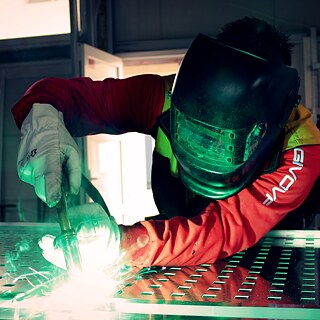Dual Vocational Training in Germany
Living and Working in Germany
Germany’s Dual Vocational Training System offers a unique opportunity to gain both practical experience and academic knowledge while you train for a rewarding profession. With hundreds of training options and strong job prospects, this pathway could be your perfect start. Explore what makes this system special and see if it’s right for you!
What is the German Dual Vocational Training System?
Germany’s Dual Vocational Training System (duale Berufsausbildung) is a unique educational model that combines hands-on, practical training at a workplace with theoretical instruction at a vocational school. It’s a popular path in Germany, where around two-thirds of young people choose this form of training after finishing school.
The program generally lasts between 2 and 3.5 years, with trainees spending part of their week (or sometimes longer blocks) at a vocational school. Here, teachers cover subjects related to your profession along with general education topics like German, English, and social studies. The remaining days are spent in a company, where you can directly apply what you’ve learned, working on real tasks like operating machinery or supporting projects. This balance of theory and practice ensures that you develop both technical knowledge and practical skills, preparing you well for the job market.
Germany currently offers 327 recognized training programs across a wide range of industries, from technical fields to healthcare and hospitality. Upon completing the program, you’ll receive a diploma or trade proficiency certificate, which is highly valued by employers in Germany and internationally.
The program generally lasts between 2 and 3.5 years, with trainees spending part of their week (or sometimes longer blocks) at a vocational school. Here, teachers cover subjects related to your profession along with general education topics like German, English, and social studies. The remaining days are spent in a company, where you can directly apply what you’ve learned, working on real tasks like operating machinery or supporting projects. This balance of theory and practice ensures that you develop both technical knowledge and practical skills, preparing you well for the job market.
Germany currently offers 327 recognized training programs across a wide range of industries, from technical fields to healthcare and hospitality. Upon completing the program, you’ll receive a diploma or trade proficiency certificate, which is highly valued by employers in Germany and internationally.
Why Choose Dual Vocational Training in Germany?
The Dual Vocational Training System offers several compelling benefits:
- Immediate skill application: What you learn in class can be applied right away at the workplace, helping you gain practical experience quickly.
- Earn While You Learn: Trainees receive a monthly 'training allowance' (an average of €1,066 before taxes), which increases annually. This amount can vary depending on the state. This income helps cover living expenses throughout the training period.
- Strong job prospects: Vocational qualifications are highly valued by German employers. In many fields, professionals with dual training are in higher demand than university graduates. Additionally, around two-thirds of trainees are hired by their training companies upon completion.
- Career flexibility: You can pursue advanced qualifications, such as master craftsman training, or continue your education after completing the program. This opens doors to higher-paying positions and career growth.
Who is Eligible to Apply?
To participate in the Dual Vocational Training System, you need to meet the following criteria:
- Educational background: A school-leaving certificate with good grades is required. If you have foreign qualifications, you may need to validate them in Germany through the ANABIN website.
- German language proficiency: You’ll need at least B1-level German to obtain a vocational training visa. For those coming to Germany to search for positions, B2-level proficiency is recommended.
- Age and other requirements: Some programs may have minimum age requirements, and specific fields may require previous work experience, like an internship.
When Does Training Take Place and How Long Does it Last?
Dual vocational training programs typically start on August 1 or September 1 each year. You’ll spend part of each week or longer blocks of time at a vocational school, where about two-thirds of the classes focus on profession-specific subjects. The rest of the time is spent in a company, where you gain hands-on experience and learn about how the business operates.
The program also includes regular assessments:
The program also includes regular assessments:
- Midway through training: You’ll take an interim exam to show how well you’ve learned to apply your skills in the workplace.
- Final examination: The program ends with a final exam, usually in German, which certifies your qualifications. Successfully passing these exams sets you up for a strong career path in Germany.
How Do I Apply and What Are the Visa Requirements?
Steps to Apply:
- Find a training position: Search for companies in Germany offering dual vocational training. Some useful resources include:
- Approval from the German Federal Employment Agency (BA): Your training position must be recognized by this agency.
- Financial requirements: You’ll need proof that you can cover your living costs while in Germany.
- Age limit of 25 years
- B2-level German proficiency
- Recognition of your school-leaving certificate
- Proof of financial resources
Ready to Begin Your Journey?
The German Dual Vocational Training System offers an exciting pathway to a fulfilling career, combining classroom learning with hands-on experience. With hundreds of training options available and strong job prospects, this system could be your ideal start to a future in Germany’s dynamic workforce. Find out more about this pathway and take your first step today!
Choosing between an Ausbildung program and a Bachelor's degree depends on your personal career goals, interests, and the field you want to work in. Here’s a comparison to help you decide:
Ausbildung Program:
Pros:- Practical Experience: You gain hands-on experience in your chosen profession while studying. This can be very valuable if you prefer learning by doing.
- Financial Independence: You earn a monthly salary during your training, which can help cover your living expenses.
- Shorter Duration: Ausbildung programs typically last 2 to 3.5 years, allowing you to enter the workforce more quickly.
- Direct Entry into the Workforce: Many Ausbildung graduates receive job offers from their training company, making it easier to start your career.
- Limited to Specific Professions: Ausbildung programs are focused on specific vocational fields, such as trades, technical jobs, healthcare, and certain services. They may not be ideal for careers in fields like research, academia, or highly specialized professions.
- Lower Starting Salary: While you can have a stable and rewarding career, the starting salary for Ausbildung graduates is generally lower compared to those with a Bachelor's degree.
Bachelor's Degree:
Pros:- Broader Knowledge Base: A Bachelor's degree provides a more theoretical and comprehensive education, which can be beneficial if you’re interested in fields like engineering, business, sciences, or humanities.
- More Career Options: A degree opens up a wider range of career opportunities, including management positions, research roles, and jobs that require advanced academic qualifications.
- Higher Earning Potential: In many fields, having a Bachelor's degree can lead to higher earning potential and career advancement opportunities.
- Longer Duration: A Bachelor's degree typically takes 3 to 4 years to complete, which means you’ll enter the workforce later compared to an Ausbildung graduate.
- Higher Costs: University education can be more expensive, and there’s no income during your studies unless you work part-time.
Which Should You Choose?
- Choose an Ausbildung Program if: You want to gain practical skills quickly, start working in a specific vocational field, and prefer hands-on training with immediate employment prospects.
- Choose a Bachelor's Degree if: You’re interested in a broader academic education, want to keep your career options open, or need a degree for your chosen profession, such as engineering, business, or academia.
Networking with other Indians in Germany can help you build connections, share experiences, and find support in your new environment. Here are some ways you can connect with the Indian community:
- Social Media Groups: Join social media groups dedicated to Indians living in Germany. These groups are a good platform to ask questions, share experiences, and connect with others who have similar backgrounds.
- WhatsApp and Telegram Groups:Many cities have specific WhatsApp and Telegram groups for Indians. These groups can be found through social media or by connecting with people already living in Germany.
- Indian Associations and Cultural Organizations: Look for Indian associations or cultural organizations in your area. They often organize events, cultural programs, and social gatherings that provide great opportunities to meet and network with fellow Indians.
- University and Alumni Networks: If you’re a student or alumnus, connect with the Indian Student Association at your university. These groups often host events, meetups, and provide support to new students.
- Events and Meetups: Attend cultural events, festivals, and meetups organized by the Indian community or other expat groups. Websites like Meetup often have groups focused on Indian culture, language, and socializing.
- LinkedIn: Use LinkedIn to connect with other Indian professionals in Germany. Join groups dedicated to networking and professional development to expand your connections.
- Networking Events and Conferences: Participate in networking events, seminars, or conferences that focus on the Indian community or your professional field. These events are ideal for meeting professionals and building your network.
Absolutely! Many graduates choose to pursue higher education, advanced certifications, or even start their own businesses.
If you’re coming to Germany from outside the EU for a dual vocational training program (Ausbildung), your employer has specific legal responsibilities to support you throughout the process. Here’s what they should handle to ensure a smooth, compliant training experience for you:
- Before You Begin Training: Your employer must verify that you have a valid visa or residence permit before you start. They are required to keep a copy of this document in your personnel file and should track the expiration date to ensure it remains valid throughout your training. This helps prevent any legal issues related to your stay in Germany.
- While You’re in Training: Since your entry visa is usually valid for 6–12 months, your employer is responsible for helping you schedule an appointment with the local foreigner’s office (Ausländerbehörde) to extend your residence permit. They should support you in securing the necessary residence permit well before your visa expires, ensuring that your status remains legally compliant for the duration of your training.
- If Your Training Program Needs to be Changed or Extended: In cases where you need to change your field of training or extend the duration (for example, to retake an exam), your employer must work with the foreigner’s office to update your residence permit. They are responsible for arranging these changes in a timely manner to avoid any disruptions in your legal status.
- At the End of Your Training
- If your training ends early, your employer is required to inform the foreigner’s office within two weeks.
- Upon successful completion of your training, your employer can assist you in applying for a residence permit as a skilled worker, which would allow you to stay in Germany and work in your profession. They should help you navigate this process, giving you a clear path to employment.
Contact us
If you have any more questions or would like to schedule a personal counselling session, please contact us by filling out this form or write to us at vorintegration-india@goethe.de
About the initiative
This initiative is part of the AMIF Project – "Pre-Integration and Transition Management: Successfully navigating the migration process." It supports individuals planning to migrate to Germany for personal or professional reasons, helping them prepare for daily life and work.




